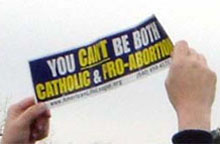There is a little-known and little-studied document from the Sacred Congregation for the Doctrine of the Faith entitled: Declaration on Procured Abortion.
In my reading of proabort arguments and pre-life rejoinders, it has become evident that most Catholics are not armed with the truths and rejoinders in this document. We’ll spend a few posts looking at key portions of the document and considering it’s prescience.
 The Declaration on Procured Abortion was issued in 1974 with the approval of Pope Paul VI who, like this document, remains underappreciated. Paul VI was a giant, squeezed between John XXIII and John Paul II, his Encyclical, Humanae Vitae along with the Congregations Declaration on Procured Abortion laid the groundwork for John Paul II’s Papacy. From the document:
The Declaration on Procured Abortion was issued in 1974 with the approval of Pope Paul VI who, like this document, remains underappreciated. Paul VI was a giant, squeezed between John XXIII and John Paul II, his Encyclical, Humanae Vitae along with the Congregations Declaration on Procured Abortion laid the groundwork for John Paul II’s Papacy. From the document:
“14. Divine law and natural reason, therefore, exclude all right to the direct killing of an innocent man. However, if the reasons given to justify an abortion were always manifestly evil and valueless the problem would not be so dramatic. The gravity of the problem comes from the fact that in certain cases, perhaps in quite a considerable number of cases, by denying abortion one endangers important values to which it is normal to attach great value, and which may sometimes even seem to have priority. We do not deny these very great difficulties. It may be a serious question of health, sometimes of life or death, for the mother; it may be the burden represented by an additional child, especially if there are good reasons to fear that the child will be abnormal or retarded; it may be the importance attributed in different classes of society to considerations of honor or dishonor, of loss of social standing, and so forth. We proclaim only that none of these reasons can ever objectively confer the right to dispose of another’s life, even when that life is only beginning. With regard to the future unhappiness of the child, no one, not even the father or mother, can act as its substitute- even if it is still in the embryonic stage- to choose in the child’s name, life or death. The child itself, when grown up, will never have the right to choose suicide; no more may his parents choose death for the child while it is not of an age to decide for itself. Life is too fundamental a value to be weighed against even very serious disadvantages.”
As we battle the rising tide of eugenic selective abortions, this paragraph slams the door on the argument over the future happiness of the child and what it is the parent may, or may not, do to act in the child’s name. Then, addressing the legitimate claims of feminism, and its distortions, the Congregation has the following to say:
“15. The movement for the emancipation of women, insofar as it seeks essentially to free them from all unjust discrimination, is on perfectly sound ground.[22] In the different forms of cultural background there is a great deal to be done in this regard. But one cannot change nature. Nor can one exempt women, any more than men, from what nature demands of them. Furthermore, all publicly recognized freedom is always limited by the certain rights of others.
“16. The same must be said of the claim to sexual freedom. If by this expression one is to understand the mastery progressively acquired by reason and by authentic love over instinctive impulse, without diminishing pleasure but keeping it in its proper place – and in this sphere this is the only authentic freedom – then there is nothing to object to. But this kind of freedom will always be careful not to violate justice. It; on the contrary, one is to understand that men and women are “free” to seek sexual pleasure to the point of satiety, without taking into account any law or the essential orientation of sexual life to its fruits of fertility,[23] then this idea has nothing Christian in it. It is even unworthy of man. In any case it does not confer any right to dispose of human life – even if embryonic- or to suppress it on the pretext that it is burdensome.”
Pretty much speaks for itself.







